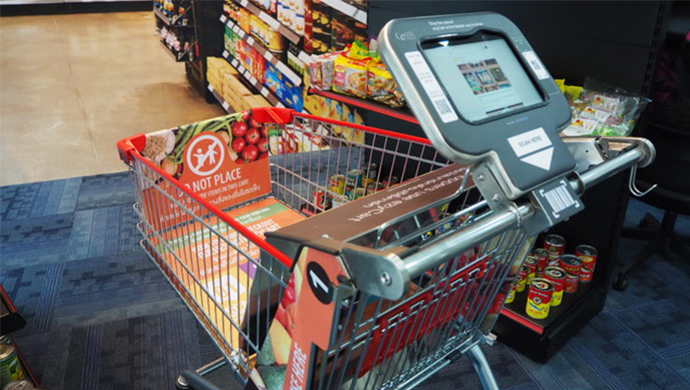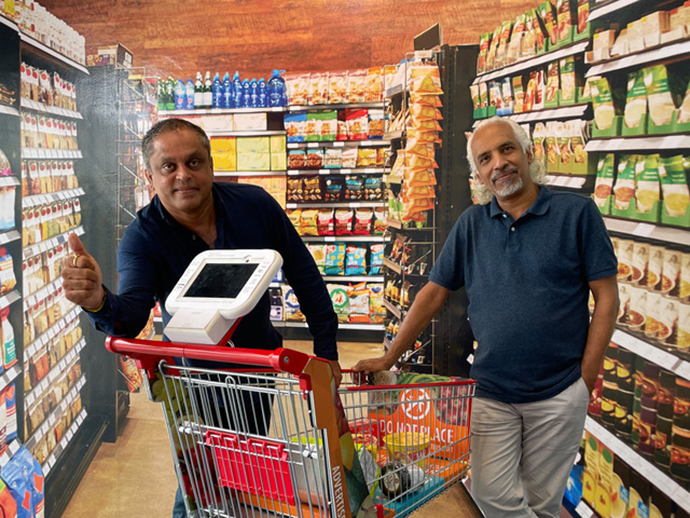
While shopping is one thing that thrived in the transition to online, there are still a lot of advantages to offline shopping, especially when it comes to groceries.
For example, there are items that you would prefer to see or touch before purchasing like seafood and produce, and there are also products that have much better variety and a wider selection in supermarkets than online. Also, sometimes you’re just already there and can immediately purchase and take home what you need.
That is not to say that shopping in physical stores doesn’t come with challenges of its own. One would be spending a lot of time looking for the products you want, then sometimes finding out that they’re not in stock. Another would be dealing with the long lines at the checkout counter or having difficulty finding assistance while shopping.
Wouldn’t it be great if some aspects of online shopping were incorporated so that you could have a better, more efficient, and even personalised shopping experience in physical stores?
Retailetics thought so too and that’s exactly what they set out to do in 2018.
The mighty shopping cart that does more than just cart things around

Founded by entrepreneurs Manirajah Kulanthavelu and Shaji Rajappan, Retailetics offers retailers an online-to-offline (O2O) platform that connects customers and retailers via three integrated products: ezyList, ezyRetail, and ezyCart.
ezyList is a free shopping list app that allows customers to share anonymised shopping list data with participating stores, check product availability, receive promotions, share recipes, and more.
With ezyRetail, retailers are provided real-time store insights into hyperlocal demand aggregated from ezyList users around their stores. These insights help retailers better plan their inventory, prices, and promotions based on real-time data rather than weeks-old historical data that they currently rely on.
Also read: AppWorks partners with e27 to help startups build investor network
And lastly, the ezyCart is a smart shopping cart using proprietary technology that allows customers to self-checkout and more for a cashless, line-free shopping experience.
Putting all these three together means customers have access to product availability information before setting foot in the store, which would likely have the products they are looking for in stock. Retailers can also send personalised promos like birthday vouchers or bundle discounts similar to what online e-commerce sites provide to entice customers to shop.
And once customers are in the store, retailers can continue to push out promos and discounts on the spot. Customers can use their smart shopping cart to find items easily, look for deals on products they care about, then checkout and pay cashless.
Quick and easy deployment at zero risk to retailers
With great shopping experience comes happy customers. Happy customers mean repeat business and better profit for retailers. For Retailetics, this is the win-win situation they are aiming for.
Another plus for the retailers is that the tech is easy to deploy and scale. It works on a subscription model, wherein Retailetics owns and maintains the carts and technology. Retailers simply need to pay the subscription fee that includes the cart, all necessary hardware, and all capabilities of the platform.
That means zero capital expenditures, zero hassle, and zero risks for retailers.
Also read: The growth of electric vehicles is saving the planet, one trip at a time
Currently, Retailetics plans to restart a test pilot with one of Thailand’s largest supermarket chains, which had been put on hold due to pandemic lockdowns. They are also now preparing to deliver test carts to retailers in Malaysia, Thailand, and Saudi Arabia.
The plan is to have at least two large retailers running pilots in each of the key Asia-Pacific (APAC) markets — Singapore, Thailand, Indonesia, Philippines, Australia, and New Zealand, as well as other APAC territories such as Hong Kong, Japan, and South Korea — by the close of 2023. The company is definitely keen to look for further opportunities in Europe, the Middle East, and Africa, while talks are already ongoing to fund expansion in Latin America and other untapped regions in the emerging economies.
With all of these goals already within its pipeline, Retailetics is poised to create a more meaningful impact and make its presence known not only in the region but across the world.
Leveraging the MaGIC ecosystem for regional expansion
Retailetics joined MaGIC through the Grill or Chill (GOC) programme and received guidance and advice from mentors. Through MaGIC, Retailetics had access to several initiatives to network with investors, accelerators, corporates, and other startups.
“MaGIC has been instrumental in connecting us with major investors in Malaysia and opening doors in other countries through their existing programmes,” said Shaji Rapajjan, co-founder of Retailetics. “The folks at MaGIC are knowledgeable, proactive, very helpful, highly patient unlike us, and simply awesome!”
Also read: From fashion to insurance, lessons on making products accessible from Igloo CCO
While the company managed to build their products and markets before even joining the MaGIC programme, they believe that their efforts are now more emphasised and have seen a more significant impact under the guidance of MaGIC.
“We consider their continued support and assistance as invaluable,” concluded Shaji.
If you’re a startup with disruptive and innovative technology looking to grow your presence in the region, you may check out MaGIC’s programmes by visiting their official page.
– –
This article is produced by the e27 team, sponsored by
We can share your story at e27, too. Engage the Southeast Asian tech ecosystem by bringing your story to the world. Visit us at e27.co/advertise to get started.
The post ASEAN’s first smart shopping cart technology is transforming the offline shopping experience appeared first on e27.

